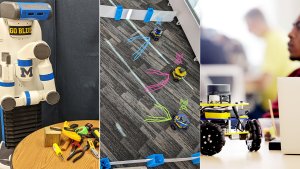Presented By: Michigan Robotics
Distributed Inference for Robotic Perception and Planning Under Uncertainty
PhD Defense, Jana Pavlasek

Chair: Chad Jenkins
Abstract:
To achieve the long-promised general robot assistants capable of interacting in the real world, robots must be able to operate robustly in unstructured real-world environments. Environments made for humans remain challenging for autonomous robots due to their highly unstructured nature which arises from environmental occlusions and dynamic environments. This dissertation considers the problem of scalable, robust robotic perception and planning in these challenging environments through distributed probabilistic inference. Distributed inference leverages graphical models to break up complex problems into multiple smaller subproblems which can be solved in parallel. This dissertation introduces three novel approaches based on this idea: first, a parts-based method for localizing articulated objects in cluttered scenes, using nonparametric belief propagation which leverages a learned likelihood and geometric priors. Second, we propose a framework for robotic planning that accounts for uncertainty in goal specification, using the planning-as-inference paradigm and formulating a novel goal loss. Third, we perform distributed planning over multi-robot teams through a new algorithm called Stein Variational Belief Propagation. Through each of these works, we demonstrate how maintaining diverse distribution modes lends robustness in challenging environmental conditions.
This dissertation also considers the challenge of robotics education to meet the growing demand for robotics and AI curricula across universities. We propose an undergraduate robotics course taught through hands-on projects involving programming a real robotic platform. Drawing on lessons from distributed inference, we employ a distributed teaching collaborative approach to teaching introductory robotics across institutions. Finally, we suggest best practices for teaching robotics as a discipline at the undergraduate level based on lessons learned teaching the course described at the University of Michigan and three partner institutions to over 100 students over the past three years.
Abstract:
To achieve the long-promised general robot assistants capable of interacting in the real world, robots must be able to operate robustly in unstructured real-world environments. Environments made for humans remain challenging for autonomous robots due to their highly unstructured nature which arises from environmental occlusions and dynamic environments. This dissertation considers the problem of scalable, robust robotic perception and planning in these challenging environments through distributed probabilistic inference. Distributed inference leverages graphical models to break up complex problems into multiple smaller subproblems which can be solved in parallel. This dissertation introduces three novel approaches based on this idea: first, a parts-based method for localizing articulated objects in cluttered scenes, using nonparametric belief propagation which leverages a learned likelihood and geometric priors. Second, we propose a framework for robotic planning that accounts for uncertainty in goal specification, using the planning-as-inference paradigm and formulating a novel goal loss. Third, we perform distributed planning over multi-robot teams through a new algorithm called Stein Variational Belief Propagation. Through each of these works, we demonstrate how maintaining diverse distribution modes lends robustness in challenging environmental conditions.
This dissertation also considers the challenge of robotics education to meet the growing demand for robotics and AI curricula across universities. We propose an undergraduate robotics course taught through hands-on projects involving programming a real robotic platform. Drawing on lessons from distributed inference, we employ a distributed teaching collaborative approach to teaching introductory robotics across institutions. Finally, we suggest best practices for teaching robotics as a discipline at the undergraduate level based on lessons learned teaching the course described at the University of Michigan and three partner institutions to over 100 students over the past three years.